Norwich Sophmore Expeditions
A new Norwich tradition takes students down the Long Trail
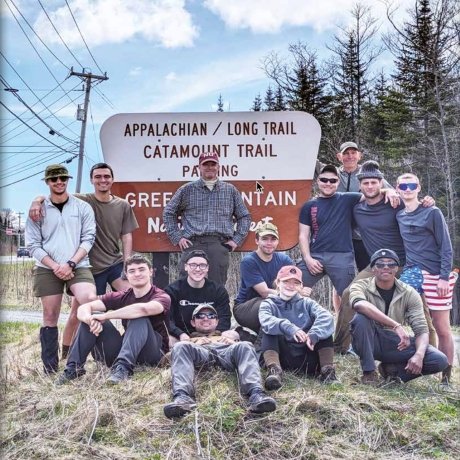
The morning after graduation in the Spring of 2023, Norwich University embarked on building a new tradition. Sixteen students, along with Commandant of Cadets Bill McCollough ’91 and three staff members, departed The Hill at first light and were dropped off at the base of Stratton Mountain along the Vermont Long Trail/Appalachian Trail to begin a multi-day hike along the oldest long-distance hiking trail in the U.S.
AN IDEA TAKES SHAPE
Commandant McCollough named the trip Norwich Sophomore Expedition I. Limited to students just finishing their sophomore year, McCollough’s vision was to add a significant milestone in the development of Norwich students. Rooks mark their first year with Rookdom, and eventually, recognition as cadets. Juniors receive their Norwich rings. Seniors earn their degrees; and many, their commissions as officers in the U.S. Armed Forces. Sophomores would now be offered the chance to mark their year by participating in an Expedition.
The Expeditions are modeled after the experiential learning pioneered by Norwich founder Captain Alden Partridge and influenced by the growth McCollough observed in fellow Marines who completed challenging military courses or certain small unit training exercises. The concept was simple: organize students into small teams, pair them with a mentor from the Commandant’s staff, and set them off into the wilderness for a week.
“I was able to learn a great deal about myself, take a self-inventory, and confirm what my strengths and weaknesses are.”
Each day would begin with a short reading about leadership or character development followed by miles of hiking, overcoming obstacles, and making decisions. Days would end with the mentor leading a guided discussion about the reading, how it applied during the day, and how it might apply to their future. Importantly, the Commandant and the mentors would not lead the Expedition; the students would select their own team leaders and assign other billets and responsibilities as they saw fit. The staff members would be there to provide subtle guidance if required, lead the reading discussions, and be the experienced safety backstop for each team. By following this construct, the Commandant hoped that student participants would:
- Overcome their perceived physical and mental limits, leading to confidence
- Face obstacles as a group, building teamwork
- Complete a task requiring commitment over many days, developing grit
- Take a break from electronic interruptions, creating self-awareness
- Break long-term objectives into daily tasks, exercising patience
- Refine their personal ethos with the guidance of a mentor
- Become more mature leaders, better prepared to guide fellow students
- Forge a shared, distinct, and enduring Norwich memory
Students who participated, but didn’t finishwould add another outcome:
- Gain the strength that comes from attemptinga task that currently lies beyond capability
In preparation during the 2022-2023 academic year, three staff members joined Commandant McCollough and began planning Expedition I. Retired U.S. Army COL Jeremy Miller, the 1st Battalion Assistant Commandant and previous Norwich professor of military science who had recently through-hiked the Appalachian Trail led the planning effort. CSM (VSM) John De Nagy, Company F Mentor and retired SEAL Master Chief, and CSM (VSM) Sean Beebe, Company E Mentor and retired Special Forces CSM, joined McCollough and Miller as mentors on the Expedition and led the effort to find likely participants. McCollough contacted several alumni friends in the Norwich Fins and Feathers organization to raise the money to buy the necessary equipment and provisions. Participants would provide their own clothes, boots, packs, and sleeping bags. The money raised would provide the tents, stoves, fuel, water purification systems, trekking poles, mosquito nets, medical kits, food, and transportation to and from the trail. The Expedition would expend no University funds.
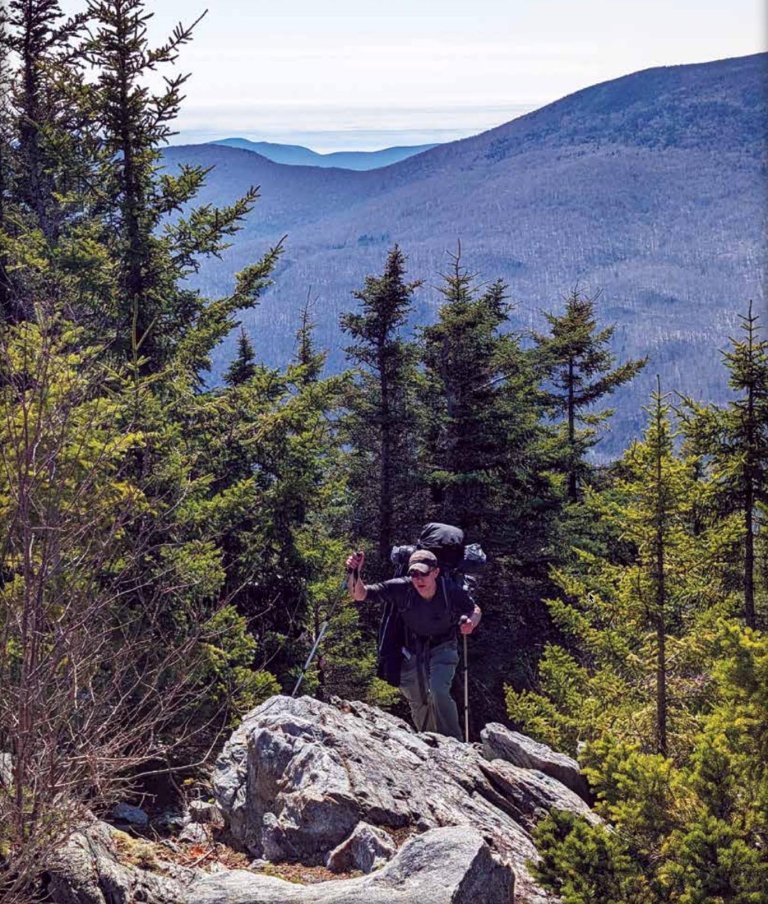
Team Leader C/SFC Joseph T. Ferencie ’25, one of the cadets entrusted with leadership responsibilities, climbs along the trail during Expedition II
More than 30 sophomores indicated interest in joining Expedition I throughout the year. As the start date drew closer, the numbers dwindled. Some students were eager to return home after finals to see friends and family or to start summer jobs or internships. For others, the prospect of spending a week on a physically challenging task grew less appealing. As final preparations began in the lead-up to graduation, 16 sophomores remained.
EXPEDITION I
After departing from Norwich, several University vans made their way to the insertion point. The lead van registered an outside temperature of 41 degrees as it pulled into the parking lot at the trailhead. The vans unloaded, safety parameters reiterated, and packs hefted; Norwich Expedition I began in a light rain.
Over the course of the next days, the weather only sporadically improved as the expedition experienced rain, sleet, and a few bright spots of fleeting sunshine. Much of the trail was running water, and the many streams that cross the trail were often swollen to the point that finding alternate crossing points was necessary. The northern sides of the mountains that the hikers traversed were still covered in snow, making progress slow as hikers often sank to their knees or higher.
While Mother Nature did not cooperate much, the teams rose to the challenge. Five members were not able to complete the Expedition, but all who reached their limits before the end exhibited grit and determination, expending themselves beyond what they thought they were capable of. As the numbers shrunk, what started out as two teams with two mentors each morphed into one team.
Over the course of the Expedition the goals were met, and the members gelled as a team. They made decisions about hiking times and shelter selection as their pace slowed due to weather; they learned to gauge their progress and pace, finding out who was good at the uphills, and who was good at the downhills; they redistributed loads to make better progress; they found the camaraderie that comes with doing hard things together; they experienced how a team is more capable and confident than an individual; and they built trust with people they barely knew before they hiked the Long Trail together. The readings about character and grit took on new meaning, backed by a new experience.
“I have finally had a moment to truly reflect on the Sophomore Long Trail Expedition and I wanted to express my sincere appreciation for having had the opportunity to participate in the inaugural event."
Eleven students finished. Soaked, tired, and cold, they smiled and joked as they devoured the grilled sandwiches and soup that CSM (VSM) Kelsie Monroe (Company G Mentor), Ms. Vanessa Middleton (Student Experience Coordinator), and Ms. Sadie Hale (Executive Secretary to the Commandant) had waiting for them when they hiked into the parking lot for the pickup back to Norwich. Cadet Jacob Medina summed up the experience well when he wrote, “I have finally had a moment to truly reflect on the Sophomore Long Trail Expedition and I wanted to express my sincere appreciation for having had the opportunity to participate in the inaugural event. I would be disingenuous if I didn’t admit that it was challenging mentally, physically, and spiritually in a way that I had never previously experienced with other activities… I was able to learn a great deal about myself, take a self-inventory, and confirm what my strengths and weaknesses are, analyze how I approach adversity, and gain valuable insight into the type of leader I endeavor to become. Thank you for coordinating such an unforgettable learning experience.”
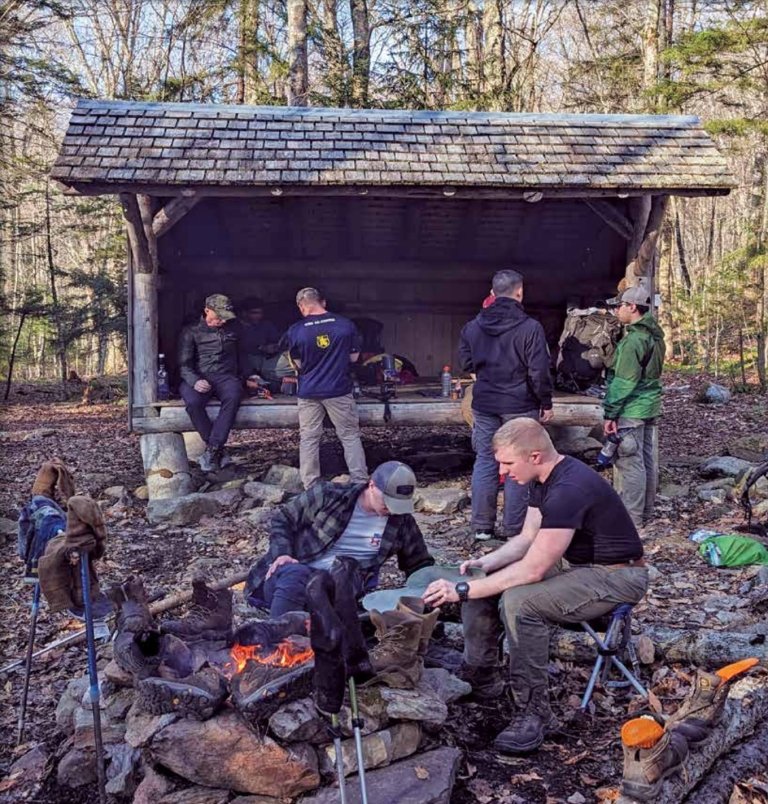
Breaks at campsites along the trail offer brief respite for the hikers.
When everyone returned to campus in the fall of 2023, the Expedition members stood in front of the new sophomore class and received their Expedition pins and coins. The pins are worn on
EXPEDITION II
With 11 Expedition juniors in leadership positions across the Corps during 2023-2024, the recruiting was better for Expedition II. Members of Expedition I helped interested students organize themselves into teams and prepare for Expedition II. After a high-water mark of nearly 60 students showing interest, 27 ultimately began the trek broken down into four teams. This growth necessitated adding another mentor to the mix, and CSM (VSM) Paul Putney, the Company B Mentor and former Army Ranger joined the effort. Monetary support from Fins and Feathers allowed every student to be issued a pack this year – the model interestingly named “The Rook.”
"What I experienced on the trail inspired me to continue trips like this annually over the course of my life.”
With more hikers and teams, the Expedition added a forward command element to the plan, staying at a hotel in southern Vermont where they could respond quickly if any student needed to come off the trail and to run resupply on days three and five. Notably, this effort was spearheaded by several students from the previous Expedition who tracked team progress via GPS.
Mother Nature was more cooperative with Expedition II, and the teams only experienced two nights and one day of rain, although an afternoon hailstorm was a first. The rest of the time provided good weather, but that didn’t mean easy traveling.
Good weather meant more miles, and the north sides of Stratton, Bromley, Peru, Styles, and Killington all provided larger than expected lengths of snow that had expedition members wondering if they should recommend snowshoes for next year’s Expedition.
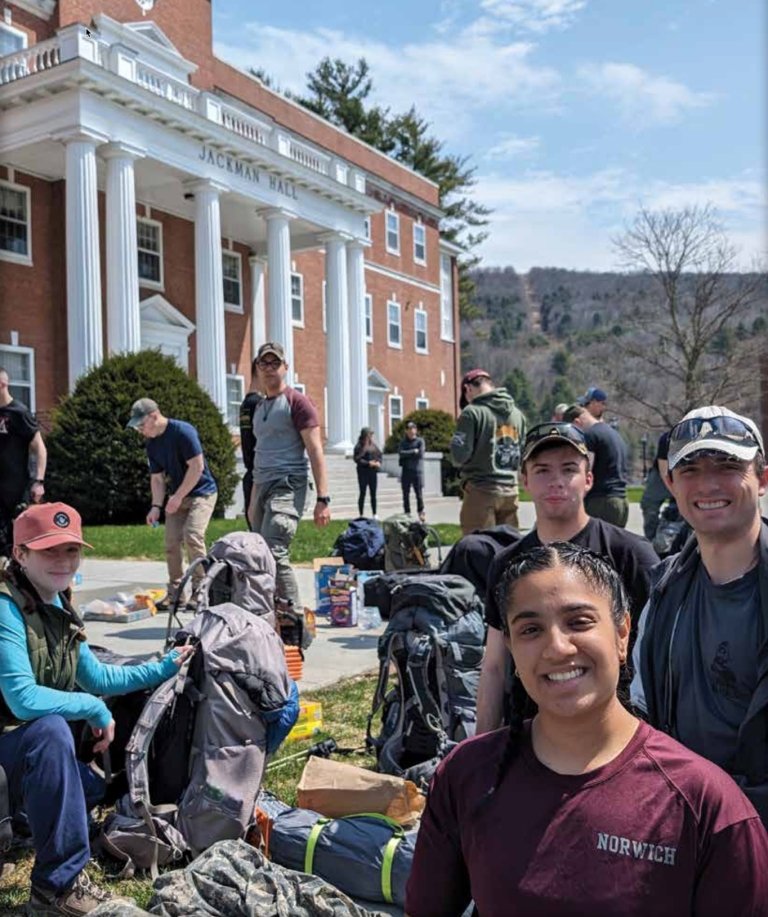
Expeditionists prepare to embark on their journey on the front steps of Jackman Hall
The readings took on a new flavor, with the “Words to Consider” booklet that Commandant McCollough sends to all deposited freshmen, providing content for the daily discussions. This year also found several of last year’s completers joining the trek as junior mentors. Expedition II continued the tradition of challenge, with 22 cadets finishing. Several of those who began but needed to be pulled out remained at the forward headquarters to help resupply efforts, adding to the team nature of the Expedition. The goals were again met, but this time with twice the number of students. The experience of Expedition II is captured by Cadet Michael Cypher who commented, “Provoking our fitness, skills, and grit, the trail was the best way we could’ve ended the semester. We planned and looked forward to this week all year and I’m extremely grateful that we had the opportunity and support to do so. What I experienced on the trail inspired me to continue trips like this annually over the course of my life.”
Upon return to The Hill, the completers were issued their Expedition pins. Their coins will be presented in front of next year’s sophomore class when Expedition III is introduced.
THE FUTURE
Based on two years of feedback, Norwich Sophomore Expeditions fill a unique role in the development of our students and mark a new tradition that shows promise for growth. Expedition leadership hopes that civilian sophomores will join Expedition III and make it part of their developmental journey, as well. Photos of the successful Expeditions can be viewed at the Shaw Outdoor Center and the logbook can be viewed at the Sullivan Museum.
Anyone wishing to support future Norwich Sophomore Expeditions can do so by donating to the Commandant’s Special Projects Fund through the Alumni and Development Office at (802) 485-2300.
Read More
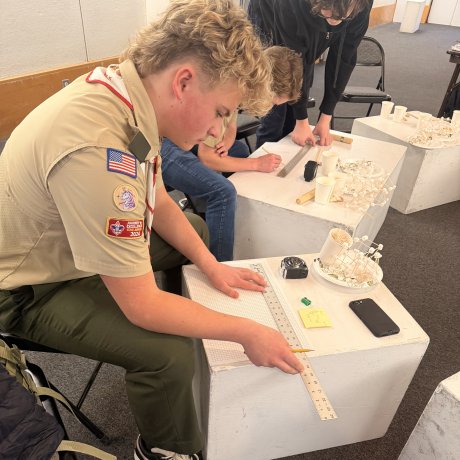
Scouting Day 2026 School of Architecture + Art Merit Badge
By Caroline Fraser '25, M'26
Local scouts take advantage of a day of learning alongside architecture students.
1 min read
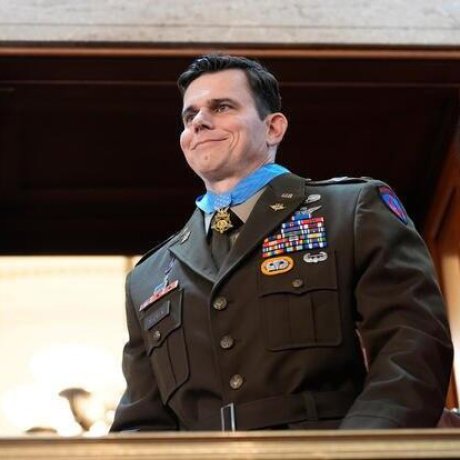
The Warrior Scholar: CW5 Eric Slover’s Medal of Honor Embodies the Norwich Spirit
By NU Marketing & Communications Office
A Norwich graduate receives the Medal of Honor during the State of the Union for his heroism — exemplifying the powerful combination of service and education in the citizen-soldier.
5 min read
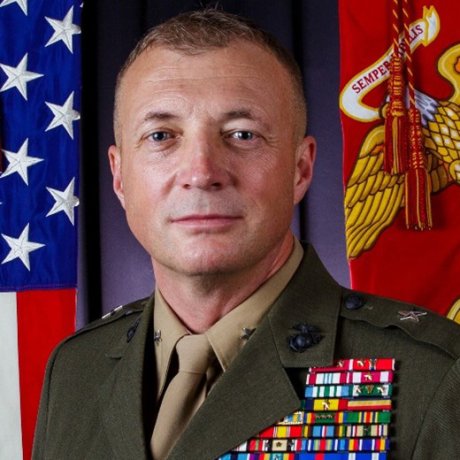
BGen Matthew Reid '93, USMC (Ret.), to return as Joint Commissioning speaker
By NU Marketing & Communications Office
A Class of 1993 alumnus will return to Norwich and address cadets at the Joint Commissioning Ceremony, bringing 32 years of Marine Corps leadership to the Class of 2026 as they enter military service.
5 min read
